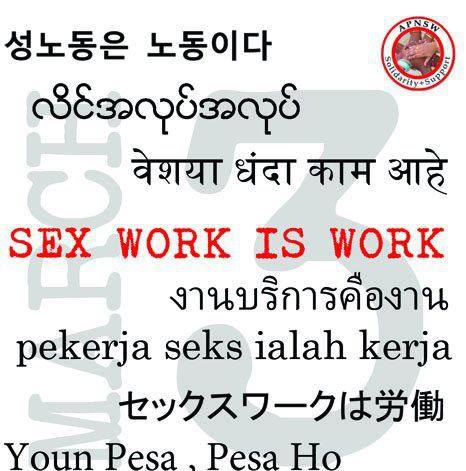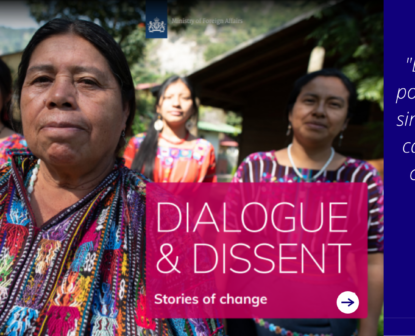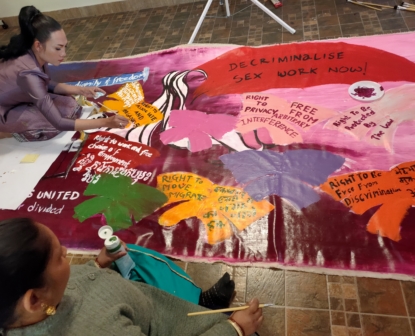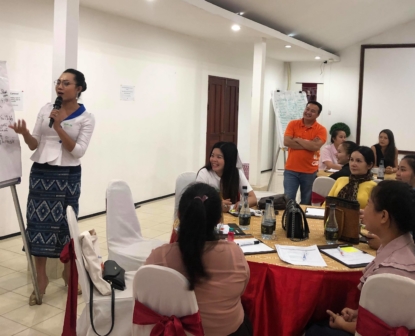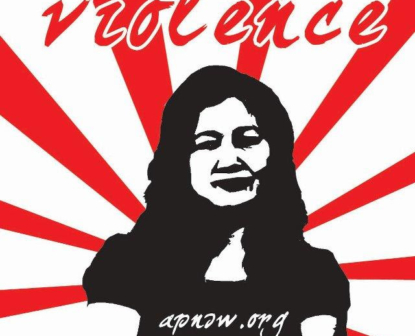Project
Fore fronting our Agendas: Advocacy to protect Sex Workers Rights
-
Amount Funded
421,000 EUROProject Duration
01 May 2018 - 30 Mar 2021 -
-
Lead organisation
Partners
International Women's Rights Action Watch Asia Pacific (IWRAW AP)
-
Asia Pacific Network of Sex Workers (APNSW) is a regional network working to promote and protect the health and human rights of sex workers in Asia and the Pacific. It was established by sex workers in 1994 at the International AIDS Conference held in Yokohama, Japan. Over the years, APNSW has successfully reached out to sex workers in over 22 countries, and supported the establishment of new sex worker groups, fostered solidarity between groups, established partnerships with other networks, and formalised itself into a registered organisation.
The network management is sex worker-led, and membership consists primarily of sex worker-led organisations. Some civil society organisations who provide rights-based services to sex workers and endorse APNSW’s vision, mission, goals and core values are also members. APNSW members elect a five-person Management Committee (MC) from among the membership to oversee the network. MC members serve on the committee for two years. APNSW has a small Secretariat based in Bangkok, which is led by a Regional Coordinator. The Secretariat, through the Regional Coordinator, is responsible for the day to day running of the network. The Regional Coordinator belongs to the sex workers community too. Currently, she is also a Board Member of the Global Network of Sex Work Project (NSWP).
-
Organisation
Asia Pacific Network of Sex Workers (APNSW) is a regional network working to promote and protect the health and human rights of sex workers in Asia and the Pacific. It was established by sex workers in 1994 at the International AIDS Conference held in Yokohama, Japan. Over the years, APNSW has successfully reached out to sex workers in over 22 countries, and supported the establishment of new sex worker groups, fostered solidarity between groups, established partnerships with other networks, and formalised itself into a registered organisation.
The network management is sex worker-led, and membership consists primarily of sex worker-led organisations. Some civil society organisations who provide rights-based services to sex workers and endorse APNSW’s vision, mission, goals and core values are also members. APNSW members elect a five-person Management Committee (MC) from among the membership to oversee the network. MC members serve on the committee for two years. APNSW has a small Secretariat based in Bangkok, which is led by a Regional Coordinator. The Secretariat, through the Regional Coordinator, is responsible for the day to day running of the network. The Regional Coordinator belongs to the sex workers community too. Currently, she is also a Board Member of the Global Network of Sex Work Project (NSWP).
-
Project
Sex workers across the world face acute human rights violations that occur in a variety of social, economic, political and legal contexts. Discriminated against by law and stigmatised and marginalised by society, sex workers confront abuse in the context of health and social care, housing, employment, and education. Far from affording protections, law and policy frameworks both at the national and international levels continue to disregard the needs of sex workers and compound their vulnerability to rights violations by criminalising their choice to work as sex workers or targeting the demand side of the sex industry without clear evidence this will decrease violence against women, combat trafficking or address specific forms of exploitation of women.
Despite sex workers rights advocates unrelenting activism, they continue to face exclusion from key agenda setting and policy making spaces. In many cases, this exclusion is compounded by co-option by civil society actors purporting to represent the interests of sex workers but advocating for the very law and policy frameworks that most oppress sex workers.
A comprehensive, human rights-based response to these multiple levels of discrimination and violations requires a nuanced approach to protecting sex workers—one that not only puts at its centre the voices of sex workers themselves but also addresses the structural inequality and systematic exclusion that produces the cycles of victimisation and violence faced by sex workers. As spaces for shaping the global conversation, movement building and policy influence continue to narrow, there is a critical need to identify and build strategies of sex work organisations focused on alternative spaces for dialogue with allies and stakeholders, for delivering and seeking policy commitments and mechanisms of empowerment and sustainability of their advocacy.
Working with national sex workers rights organisations in Cambodia, Lao PDR, Indonesia, Nepal and Thailand, APNSW and its partner the International Women’s Rights Action Watch Asia-Pacific (IWRAW AP) implement Forefronting our Agendas to combat discrimination and violence against sex workers through amplifying voices of sex workers rights advocates in and fore fronting their agendas at relevant global and national policy advocacy spaces. The project enhance the technical capacity of sex workers rights advocates to engage with the international women’s rights framework and provide support to national sex workers rights advocates to undertake a sustained strategy on CEDAW activism encompassing research, documentation, advocacy and dissemination and thereby strengthen the meaningful participation of sex workers rights advocates in the CEDAW review process. It also creates spaces for cross-movement alliance building and networking at the national and regional levels and provide a platform for cross-regional exchanges between sex workers rights advocates from Asia and Africa. Consequently, it strengthens connections and builds networks to mobilise support for CEDAW activism on sex workers rights.
-
-
Sex workers across the world face acute human rights violations that occur in a variety of social, economic, political and legal contexts. Discriminated against by law and stigmatised and marginalised by society, sex workers confront abuse in the context of health and social care, housing, employment, and education. Far from affording protections, law and policy frameworks both at the national and international levels continue to disregard the needs of sex workers and compound their vulnerability to rights violations by criminalising their choice to work as sex workers or targeting the demand side of the sex industry without clear evidence this will decrease violence against women, combat trafficking or address specific forms of exploitation of women.
Despite sex workers rights advocates unrelenting activism, they continue to face exclusion from key agenda setting and policy making spaces. In many cases, this exclusion is compounded by co-option by civil society actors purporting to represent the interests of sex workers but advocating for the very law and policy frameworks that most oppress sex workers.
A comprehensive, human rights-based response to these multiple levels of discrimination and violations requires a nuanced approach to protecting sex workers—one that not only puts at its centre the voices of sex workers themselves but also addresses the structural inequality and systematic exclusion that produces the cycles of victimisation and violence faced by sex workers. As spaces for shaping the global conversation, movement building and policy influence continue to narrow, there is a critical need to identify and build strategies of sex work organisations focused on alternative spaces for dialogue with allies and stakeholders, for delivering and seeking policy commitments and mechanisms of empowerment and sustainability of their advocacy.
Working with national sex workers rights organisations in Cambodia, Lao PDR, Indonesia, Nepal and Thailand, APNSW and its partner the International Women’s Rights Action Watch Asia-Pacific (IWRAW AP) implement Forefronting our Agendas to combat discrimination and violence against sex workers through amplifying voices of sex workers rights advocates in and fore fronting their agendas at relevant global and national policy advocacy spaces. The project enhance the technical capacity of sex workers rights advocates to engage with the international women’s rights framework and provide support to national sex workers rights advocates to undertake a sustained strategy on CEDAW activism encompassing research, documentation, advocacy and dissemination and thereby strengthen the meaningful participation of sex workers rights advocates in the CEDAW review process. It also creates spaces for cross-movement alliance building and networking at the national and regional levels and provide a platform for cross-regional exchanges between sex workers rights advocates from Asia and Africa. Consequently, it strengthens connections and builds networks to mobilise support for CEDAW activism on sex workers rights.
-
News

